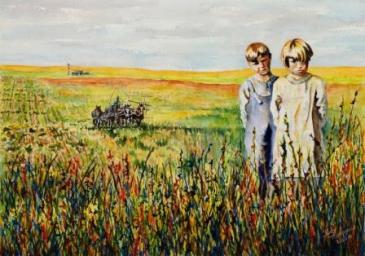Illinois: Pioneers and Prairies
Illinois is called the prairie state. Long ago, most of the land was prairie. A prairie is a kind of grassland. The grass in a prairie is very high. It can get to be six feet tall.
Pioneers are people who do something for the first time. Although Native Americans lived in Illinois for a long time, the people who came to build houses here were called pioneers. They were the first people to come to set up towns. The Native Americans had moved from place to place.
The pioneers were called settlers. That is because they came to stay. Settle means stay. It was hard to get to Illinois. The pioneers had to bring most of what they needed to live with them. They traveled in wagons. Horses or oxen pulled the wagons. They traveled for many days.
The pioneers came from another place. They came to Illinois to find a good place to live. Many were farmers. They knew the land here was good. They brought tools to farm. They brought axes and other tools, too.
The first thing the pioneers did was clear their land. They cut down the prairie grass. Then they dug in the soil. They would plant corn. They would plant wheat. They grew vegetables, too. And they raised chickens and pigs.
It was hard work. The children worked, too. They planted. They helped in the home. They did not go to school at first. There was no school.
Pioneers were glad to be in Illinois. They had good land. They could get water from creeks and rivers. They could go fishing. They could hunt, too. They could grow crops.
As soon as more pioneers came, they would make a town. They would choose leaders. They would name their town. They would set up a government. The government would set up laws. The town would build a school. But parents said that the school should be closed in summer.
